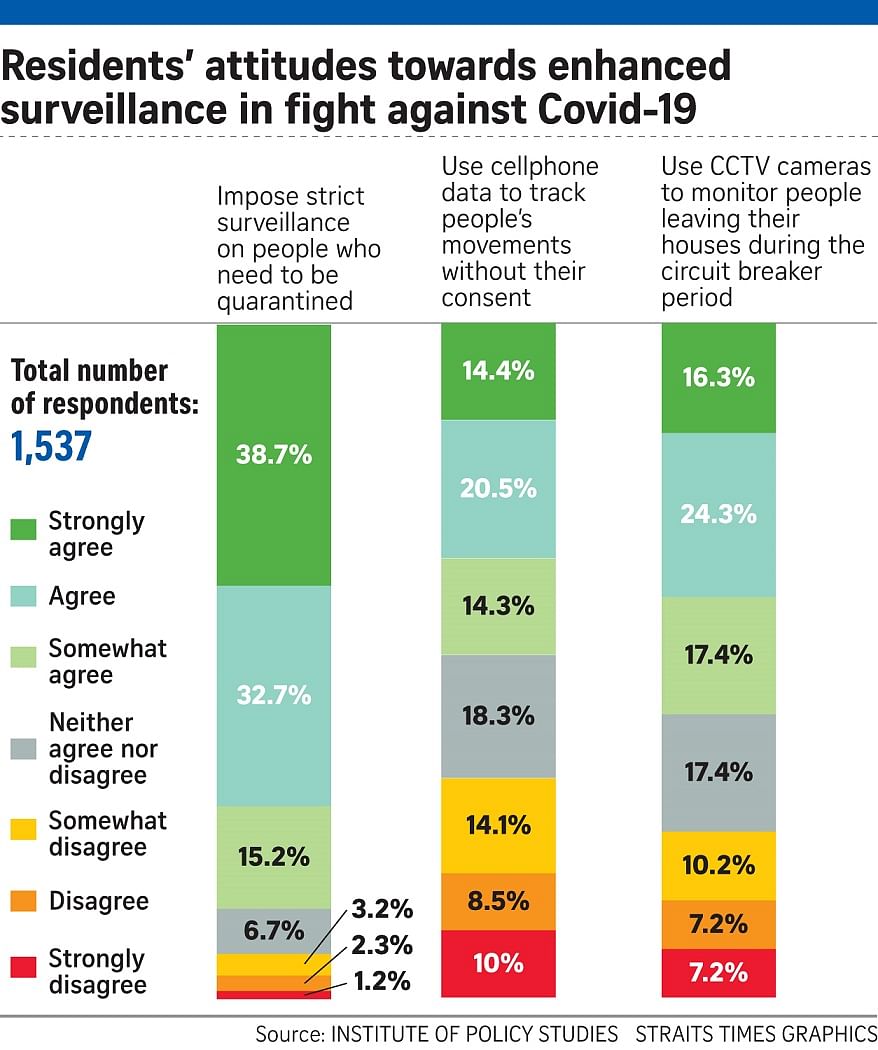Singaporeans are willing to sacrifice some level of privacy amid the coronavirus pandemic in order to keep safe and resume their normal activities as soon as possible, but the type of technology and how it is used determine public acceptability, a study has found.
Just under half of Singapore residents are agreeable to having their cellphone data tracked without their consent for the sake of contact tracing, according to a survey on attitudes towards the use of surveillance technologies in the fight against Covid-19.
And nearly six in 10 support the use of closed-circuit television (CCTV) cameras to monitor people's movements during the circuit breaker period, according to the study by the Institute of Policy Studies (IPS) released on Sunday.
The study's authors, who based their findings on the survey's data, said CCTV cameras may be more acceptable, for example, as their use is widespread and they are associated with general safety.
IPS senior research fellow Mathew Mathews told The Straits Times that different technologies have different meanings attached to them.
"When you think about mobile phones, you think of something personal and private. The thought that this device can also be tracking your movements, who you come into contact with, and all this information may be accessible to someone else, can be unnerving," he said.
Dr Mathews, senior research fellow Alex Tan and research associate Syafiq Suhaini are the study's authors.
The online survey, conducted by marketing research firm Toluna between April 22 and May 19, asked respondents how much they agreed or disagreed with potential measures that the Government could take to prevent the spread of Covid-19.
Possibilities include stricter lockdowns with roadblocks, severe penalties for infringement of policies and the use of surveillance technology, such as the use of cellphone data without consent to track a person's movements.
Of the 1,537 people surveyed, 87 per cent supported strict surveillance of those who need to be quarantined.
Nearly eight in 10 said it is important to report those who do not practise social distancing measures during the circuit breaker period to the authorities.
The study found that some groups were more open to the use of surveillance technologies, including respondents who favoured social policing, approved of the Government's handling of the pandemic or reported being stressed by the situation.
Some respondents said their mental and emotional states have been affected by issues surrounding the Covid-19 outbreak, with 23 per cent reporting difficulty concentrating and 22 per cent showing irritable behaviour or outbursts of anger.
Of those who said that they found it very difficult to concentrate, 67 per cent supported cellphone tracking without consent, while 69 per cent agreed to CCTV monitoring during the circuit breaker period.
"These respondents possibly hoped that by expanding surveillance, the pandemic could be quickly tackled and their worries would be resolved," the study said.
There were also differences according to gender and employment status when it came to attitudes towards surveillance, with males and full-time employees showing more openness to it.
Of those who supported cellphone tracking without consent, 77 per cent agreed that downloading contact-tracing applications should be made mandatory.
The study noted that the response to the Government's TraceTogether contact-tracing app has been lacklustre, due in part to its use being voluntary.
About six in 10 respondents agreed that TraceTogether or a similar contact-tracing phone app should be made mandatory to download, and its use compulsory for entry to public places.
Even those who had expressed discomfort with the ethics of government surveillance and loss of privacy showed support for such a move, the study noted.
"The findings here suggest that many Singaporeans feel that if contact tracing is going to be effective in managing the Covid-19 situation post-circuit breaker, not only must the technology be robust, but the roll-out of the initiative also has to be resolute - do it well and go all the way or not do it at all."



